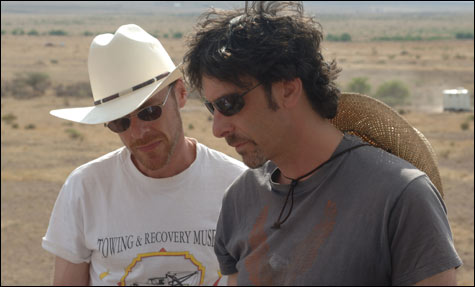
THE COEN BROTHERS: Death, evil, and . . . a heap of Oscars? |
All kinds of voting has been taking place lately — for presidential candidates, for union contracts, for Oscar nominees. Only the last-mentioned has no real-life consequences (apart from a not negligible impact on box-office grosses). So the results of the Oscar ballot might be the truest indicator of what’s really on the minds of those voting in the Academy, and those they’d like to think they represent — everyone in America.
Many of these Academy voters might be campaigning for Barack Obama, for change we can believe in, but in their hearts, to judge by whom they’ve already nominated for Oscars, they think any change will only be for the worst. They might indeed believe that, “Yes we can!” But they seem to suspect is that what we can will probably be more of the same.
Of course, Obama isn’t the only politician whom their Oscar votes will reflect. Like John McCain and Hillary Clinton, they agree that experience matters, because the ingrained habits of folly and malice will triumph every time.
In short, this is the year that death and evil will stalk the Oscars. Given that it has won awards from Producers Guild, the Writers Guild, and the Screen Actors Guild, not to mention Golden Globes and prizes from every major critics’ group, there’s no reason to think that the Coen Brothers’ No Country for Old Men won’t take the big ones, too — the Oscars for Best Picture, Best Director(s), and Best Supporting Actor for Javier Bardem, the embodiment of Death with a bad haircut. (Throw in Best Adapted Screenplay, too.)
As for evil, Daniel Day-Lewis drinks every one else’s milkshake. True, George Clooney in Michael Clayton and Tommy Lee Jones in In the Valley of Elah make good cases for the ineffectuality of good intentions. And Johnny Depp (Sweeney Todd) and Viggo Mortensen (Eastern Promises) engage in more hands-on wickedness than There Will Be Blood’s ruthless oil baron. But Day-Lewis epitomizes what many will recognize as the greatest evil of our age: life-destroying greed and its unholy alliance with self-righteous piety. In short, the now crumbling basis of Republican power.
In the women’s races there might be a more competitive contest. In the Best Actress category, the most optimistic of the year’s movies, Juno, should have its best chance of victory (aside from Best Original Screenplay, which should go to Diablo Cody). Most optimistic? Regardless of your opinion of this film, you’d have to admit that it takes place in a fairy-tale land where the only problems a pregnant 16-year-old faces are a snippy sonogram technician and an older guy with delusions of being a rock star. Romania 1988 it is not.
So Ellen Page might have a shot against the favorite, Julie Christie as the Alzheimer’s sufferer in Away from Her. Unlike Juno, that film touches on a real problem and doesn’t cop out with glibness and platitudes. On the other hand, its story might draw parallels to that of a certain presidential candidate with a philandering husband who forgets the past and sets out on her own . . . Mostly, though, I think Christie will win because she represents Hollywood at its best.
Finally, there’s the booby prize of Oscar categories, Best Supporting Actress. It’s where Academy voters feel emboldened to indulge in odd tastes or speak their minds. Ruby Dee looked like a viable candidate after her Screen Actors Guild award; she, too, is an icon, largely unrewarded, and as the title villain’s long-suffering mom, she’s the main reason to see American Gangster. But I think the prize will go to a different kind of mother, the model of irresponsible parenthood played by Amy Ryan in Gone Baby Gone, the closest the Oscars will get to an anti-Juno.